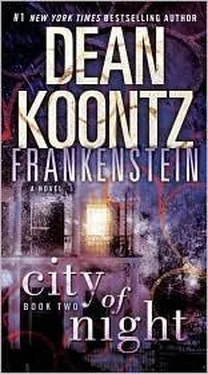She hoped to find a journal of his most tender secrets, his hopes, his considered observations on life and love. In truth, it was unrealistic to suppose that two steel doors and an electrocution tunnel had been installed merely to ensure that his diary could be kept somewhere more secure than a nightstand drawer.
Nevertheless, she wished intensely that she would discover just such a handwritten, heartfelt account of his life, so she could know him, know him to the core, the better to serve him. She was a little surprised — but pleasantly so — to find that she seemed to be such a romantic.
The fact that the dead bolts were on the outside of these doors had not been lost on her. She made the obvious inference: that the intent had been to imprison something.
Erika was not fearless, but neither could anyone fairly call her a coward. Like all of the New Race, she possessed great strength, agility, cunning, and a fierce animal confidence in her physical prowess.
Anyway, she lived every minute by the sufferance of her maker. If ever she were to hear, spoken in Victor’s voice, the order to terminate herself, she would unhesitatingly obey, as she had been programmed.
William, the butler, had received such instructions on the phone and, even in his distracted condition, had done as ordered. Just as he could turn off pain — as could they all in a time of crisis — so could he shut down all autonomic nerve functions when thus commanded. In an instant, William had stopped his own heartbeat and respiration, and died.
This was not a trick he could have used to commit suicide. Only the word-perfect ritual instruction, delivered in his master’s voice, could pull that trigger.
When your existence depended entirely on such sufferance, when your life hung by a gossamer filament that could be cut by the simple scissors of a few sharp words, you couldn’t work up much dread about what might be contained behind two bolted steel doors.
Erika opened the second door, and lamps brightened automatically in the space beyond. She crossed the threshold and found herself in a cozy Victorian drawing room.
Windowless, the twenty-foot-square space had a polished mahogany floor, an antique Persian carpet, William Morris wallpaper, and a coffered mahogany ceiling. The ebonized-walnut fireplace featured William de Morgan tiles around the firebox.
Bracketed by a pair of lamps in fringed shades of Shantung silk, an overstuffed chesterfield with decorative pillows in Japan-themed fabrics offered Victor a place to lie down if he wished, not to nap (she imagined) but to relax and to let his brilliant mind spin out new schemes unique to his genius.
In a wingback chair with footstool, he could contemplate while upright, if he chose, under a floor lamp with a beaded shade.
Sherlock Holmes would have been at home in such a room, or H.G. Wells, or G.K. Chesterton.
The focal point, from either the plump sofa or the chair, was an immense glass case: nine feet long, five feet wide, and more than three feet deep.
As much as possible, this object had been crafted to complement the Victorian decor. It stood upon a series of bronze ball-in-claw feet. The six panes of glass were beveled at the edges to charm the light, and were held in an ornate ormolu frame of beautifully chased bronze. It appeared to be a giant jewel box.
A semiopaque reddish-gold substance filled the case, and defied the eye to define it. One moment this material seemed to be a liquid through which circulated subtle currents; yet just a moment later it seemed instead to be a dense vapor, perhaps a gas, lazily billowing along the glass.
Mysterious, this object drew Erika just as the lustrous eyes of Dracula drew Mina Harker toward her potential doom in a novel that was not likely to be a source for literary allusions suitable to the average formal dinner party in the Garden District but that was in her downloaded repertoire nonetheless.
Being refractive, the fluid or vapor absorbed the lamplight and glowed warmly. This internal luminosity revealed a dark shape suspended in the center of the case.
Erika could not see even the vaguest details of the encased object, but for some reason she thought of a scarab petrified in ancient resin.
As she approached the case, the shadow at its core seemed to twitch, but most likely she had imagined that movement.
From City Park, Carson drove to the Garden District to cruise the streets around the Helios residence.
They were not yet ready to shoot their way into the mansion and go on a Frankenstein hunt, but they needed to scope the territory and lay out escape routes in the-unlikely-event that they were able not only to kill Victor but also to get out of his house alive.
En route, she said to Michael, “Those people in the white Mercury Mountaineer, back there in the park — did they look familiar to you?”
“No. But he waved.”
“I think I’ve seen them before.”
“Where?”
“I can’t quite remember.”
“What are you saying? Did they seem dubious to you?”
Checking the rearview mirror, Carson said, “I didn’t like his smile.”
“We don’t shoot people in New Orleans for having an insincere smile.”
“What were they doing on the service road? That’s only for the use of park personnel, and that wasn’t a park vehicle.”
“We aren’t park personnel, either. Under the circumstances, it’s easy to get paranoid.”
“It’s stupid not to be paranoid,” she said.
“You want to go back, find them, and shoot them?”
“I might feel better,” she said, checking the mirror again. “You want to call Deucalion, set up a meet?”
“I’m trying to picture how the original Frankenstein monster applies for a cell phone.”
“It belongs to Jelly Biggs, the carny who lives at the Luxe, the friend of the guy who left the theater to Deucalion.”
“Who names their kid Jelly Biggs? They doomed him to fathood.”
“It’s not his real name. It’s his carny name, from his days in the freakshow.”
“But he still uses it.”
“Seems like if they’re in the carnival long enough, their carny monikers become more comfortable than their real names.”
“What was Deucalion’s freakshow name?” Michael asked.
“The Monster.”
“That had to be before political correctness. The Monster — what a self-esteem quasher. These days they’d call him the Different One.”
“Still too stigmatizing.”
“Yeah. He’d be called the Unusual Beauty. You have his number?”
She recited it while Michael keyed the digits in his phone.
He waited, listened, and then said, “Hey, this is Michael. We need to meet.” He left his number and terminated the call. “Monsters — they’re all so irresponsible. He doesn’t have his phone on. I got voice mail.”
In the coat closet off the hall between the living room and the kitchen, Randal Six is not yet fully happy, but he is content, for he feels at home. At last he has a home.
Former hospitals converted into laboratories for cloning and biological engineering do not in his experience have coat closets. The very existence of a coat closet says home .
Life on the bayou does not require a collection of overcoats and parkas. Hanging from the rod are only a few light zippered jackets.
Boxed items are stored on the floor of the closet, but he has plenty of room to sit down if he wants. He is too excited to sit, however, and stands in the dark, all but quivering with expectation.
He is content to remain on his feet in the closet for hours if not days. Even this narrow space is preferable to his billet at Mercy and to the fearsome machines to which his maker has often manacled him in the conduct of painful testing.
Читать дальше












